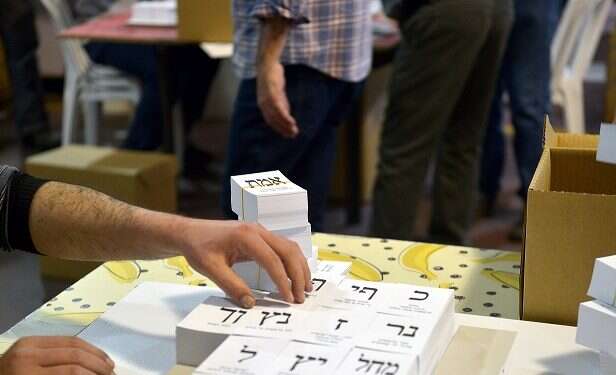If the Knesset election were held now, Blue and White would win 32 seats, compared to 28 seats for the Likud – meaning that while both parties gained from last week, Blue and White would retain its lead, this week's election poll by Israel Hayom-i24NEWS indicates.
The Labor party, which is struggling not to lose votes to Blue and White, dropped slightly and was projected to win eight seats, one fewer than last week.
A senior Labor party official expressed frustration at the results and said, "For a month and a half, we've been running a campaign that is helping Blue and White, too, and in exchange, they're spitting in our faces."
Meretz held steady from last week at six seats.
According to the Labor official, "the Center-Left should vote for Labor, and Blue and White should be taking votes from the Right, but the votes aren't moving. Just this week, we saw a rocket fall on the Sharon region. We would have expected them to appear on TV and attack Netanyahu, and rather than doing that, they put out a video talking about how many times Bibi said 'Benny Gantz' or one that shows the four of them sitting and having coffee."
"The weak campaign they're running shows they intend to sit in a government with Netanyahu after the election," the official said.
The Likud is also preparing for the possibility that Blue and White might grow at the expense of the left-wing bloc as a whole. While party leaders Benny Gantz and Yair Lapid could possibly take votes from Labor and Meretz, the Likud has little chance of doing something similar because so many of the right-wing parties running in the election are hovering near the minimum electoral threshold.
Still, one party in the right-wing bloc remains stable – United Torah Judaism, and the Likud is trying to court UTJ voters. On April 7, two days before the election, the Likud plans to hold a major event for the haredi public. The party has already rented a space in the heart of Jerusalem's haredi area.
Meanwhile, the seats Likud is gaining are coming at the expense of the Union of Right-Wing Parties (Habayit Hayehudi, National Union, and Otzma Yehudit), which dropped one seat from last week, dropping from seven to six. The New Right under Education Minister Naftali Bennett and Justice Minister Ayelet Shaked retained the six seats it was predicted to win last week.
Shas was also projected to win six seats, as was UTJ and far-right activist Moshe Feiglin's Zehut party, the same number predicted for them last week. The poll predicted that Yisrael Beytenu and Kulanu would both make it over the minimum threshold with five seats each.
The Arab Hadash-Ta'al list was predicted to wing six seats.
Looking at the larger blocs, the Right – assuming that Yisrael Beytenu were to join the coalition – would win a total of 62 seats. If Feiglin joins the coalition as well, it would give the Right 68 seats. The Left, however – even with the Arab parties – can only get to 52 seats, the latest poll shows.
When asked who they thought was best suited to serve as prime minister, 46% of respondents picked Netanyahu, compared to 36% who thought Gantz was the best candidate for prime minister.
Half of all respondents said they gave Netanyahu "most" or "much" of the credit for the U.S. decision to recognize Israeli sovereignty on the Golan Heights.
While the upcoming elections in Israel have been wrought with corruption, hacking scandals, banned candidates and personal attacks, the average Israeli voter has remained unbelievably unswayed, instead focusing on two key issues: the economy and security.
The poll showed that issue considered most likely by voters to influence their choice at the ballot box on April 9th is the economy, 29% of respondents said.
At the end of last year, the state budget was in a deficit of 9 billion shekels ($2.5 billion), representing approximately 3.6% of the country's gross domestic product, a substantial spike since the previous year.
The national debt is likely to remain an issue given the other significant issue concerning voters – security.
Less than one-third (28%) of respondents said that security was the key issue that would influence their vote.
Meanwhile, despite the plethora of scandals and accusations circulating around the top two contenders, only 10% of respondents cited corruption as the key issue to influence their voting decision.




